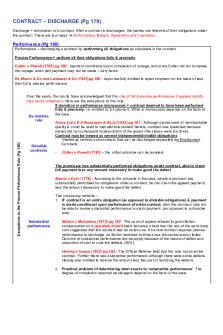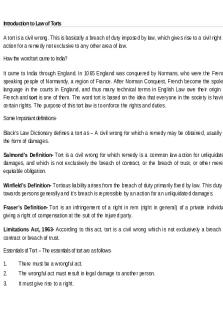DISCHARGE OF OBLIGATIONS INTRODUCTION TO FRUSTRATION PDF

| Title | DISCHARGE OF OBLIGATIONS INTRODUCTION TO FRUSTRATION |
|---|---|
| Course | Law of Contract |
| Institution | Nottingham Trent University |
| Pages | 3 |
| File Size | 92 KB |
| File Type | |
| Total Downloads | 37 |
| Total Views | 134 |
Summary
Various tutors gave these lessons....
Description
LECTURE 26 DISCHARGE OF OBLIGATIONS INTRODUCTION TO FRUSTRATION There are occasions in which the courts will discharge the parties of obligations under the contract. The effect of discharge will mean they are no longer liable for any further obligations under the contract. Obligations can be discharged in a number of ways: (a) (b) (c)
Discharge by agreement Discharge by breach Discharge by performance.
We will focus on the discharge of obligations under the doctrine of frustration. Frustration : The Common Law A contract is described as being “frustrated” when an event occurs after the formation of the contract, which is beyond the control of either party, which makes the obligations under that contract impossible or illegal to perform or radically alters the nature of the obligations. After the parties have concluded a contract, events beyond their control may occur which ‘frustrate’ the purpose of their agreement, or render it very different, or impossible, or even illegal, to perform. The frustrating event must also not be the fault of either party or foreseeable. The effect of frustration is that the parties are released from their contractual obligations. Origins of rule Until the nineteenth century the common law adopted a doctrine of absolute obligation to perform a contract (the ‘absolute contracts’ rule). Contractual promises had to be performed even after a major change of circumstances. So, in Paradine v Jane (1647) Aleyn 26 A tenant was sued for arrears of rent and in defence pleaded that for the last three years he had been dispossessed of his farm by the King's enemies during the English Civil War. HELD: that the tenant was liable even though dispossessed – i.e. there was no implied term that if there was no benefit, there was no obligation. The rationale of this somewhat harsh rule was that a party could always make express provision for unforeseen events and, if he did not do so, he should be bound by his contractual obligations.
Frustration developed to alleviate harshness of absolute obligation rule -
Taylor v Caldwell (1863) 3 B & S 826, 122 ER 309 The defendant agreed to hire to the claimant the Music Hall and Surrey Gardens for the purposes of entertainment. Before the day of the performance, due to no
fault of either party, the music hall was destroyed by fire. The claimant sued the defendant for breach of contract, in particular claiming damages for the money wasted on advertising the concerts. HELD: that the defendant was not liable and the contract had been frustrated. The fire was not the fault of either party, nor was there any contractual provision to cover such a contingency. The parties were excused their obligations under the contract.
What Constitutes a Frustrating Event? i.e. what events are sufficiently serious to render performance impossible or radically different. It is possible to identify certain occurrences or events which have been recognised by the courts as amounting to frustration of the contract.
(a)
Destruction of subject-matter. Taylor v Caldwell (above)
In the same way that the destruction of the subject matter prior to the formation of a contract will render it void for common mistake, destruction at a later stage will fall within the doctrine of frustration, as indicated by Taylor v Caldwell. Complete destruction is not necessary. If what is destroyed is fundamental to the performance of the obligations under the contract, then the doctrine will operate. (b)
Non-availability of one of the parties due to death, illness or other circumstances.
Most commercial contracts do not require performance by a particular person and no other. Therefore, death or illness does not normally prevent performance of the contract. But where a contract is for some personal service to be rendered by a party to the contract, for example, a contract of employment, the death or incapacity of that party will make performance impossible. Condor v The Barron Knights Ltd., [1966] 1 WLR 87 Edward Lottian Condor, a talented drummer, was contracted to play seven nights per week with the Barron Knights pop group, when he had a minor nervous breakdown. He was advised by a doctor that to continue the demanding schedule might well lead to a major breakdown.
(c)
Supervening illegality
A contract would become frustrated where performance would be contrary to some law subsequently passed. For example in: Avery v Bowden, (1856) 6 E & B 953 The defendant chartered (i.e. hired) the claimant’s ship to load a cargo at Odessa within forty-five days. The ship was ready to load but the defendant repeatedly
told the ship’s captain that he could not obtain a cargo. Before the forty-five days were up the Crimean war broke out and it became illegal to load a cargo at an enemy port. .(d) Non-occurrence of event forming basis of contract. Krell v Henry, [1903] 2 KB 740 The defendant agreed to hire a flat from the claimant for 26th and 27th June 1902. The contract contained no reference to the coronation processions, but they were to take place on those days and were to pass the flat. The processions were cancelled due to the illness of Edward VII and the claimant sued to recover rent not already paid.
HELD: (CA) that the claimant failed, the contract was frustrated despite the fact that its performance was still physically and legally possible. The coronation procession was regarded by both parties as the foundation of the contract. A suite of rooms in Pall Mall would not normally be hired on a daily basis and the high price clearly indicated that the parties had a specific purpose in entering into the contract.
Herne Bay Steamboat Co. v Hutton [1903] 2 KB 683 The defendant chartered the SS Cynthia from the claimant for 28th and 29th June 1902 for the express purpose of taking paying passengers to see the coronation naval review by Edward VII at Spithead and to tour the assembled fleet. The review was cancelled due to Edward VII's pneumonia but the fleet remained assembled. The defendant did not use the Cynthia on either of the agreed days and the claimant sued for the balance of the hire charges. HELD: (CA) that the contract was not frustrated and the claimant could recover its loss of profit from the defendant. The court felt that the naval review was not the basis or foundation of the contract despite the reference made to this event in the contract.
(e)
Government intervention Metropolitan Water Board v Dick, Kerr and Co. Ltd [1918] AC 119 Respondents agreed to construct a reservoir, to be completed within six years. Builder’s land and plant compulsorily requisitioned by the Government following the outbreak of WWI. The contract was frustrated due to the undue delays caused by the nature of the suspension of the contract....
Similar Free PDFs

7. Discharge by frustration
- 12 Pages

Discharge of Contracts
- 5 Pages

Discharge of Contract
- 8 Pages

Passing of Risk and Frustration
- 6 Pages

Discharge of contract summary
- 8 Pages

Contract - Frustration
- 7 Pages

Law - 11 Discharge of contract
- 7 Pages

Introduction to Law of Torts
- 14 Pages

Contract- discharge of a contract
- 12 Pages

Extinguishment OF Obligations
- 38 Pages
Popular Institutions
- Tinajero National High School - Annex
- Politeknik Caltex Riau
- Yokohama City University
- SGT University
- University of Al-Qadisiyah
- Divine Word College of Vigan
- Techniek College Rotterdam
- Universidade de Santiago
- Universiti Teknologi MARA Cawangan Johor Kampus Pasir Gudang
- Poltekkes Kemenkes Yogyakarta
- Baguio City National High School
- Colegio san marcos
- preparatoria uno
- Centro de Bachillerato Tecnológico Industrial y de Servicios No. 107
- Dalian Maritime University
- Quang Trung Secondary School
- Colegio Tecnológico en Informática
- Corporación Regional de Educación Superior
- Grupo CEDVA
- Dar Al Uloom University
- Centro de Estudios Preuniversitarios de la Universidad Nacional de Ingeniería
- 上智大学
- Aakash International School, Nuna Majara
- San Felipe Neri Catholic School
- Kang Chiao International School - New Taipei City
- Misamis Occidental National High School
- Institución Educativa Escuela Normal Juan Ladrilleros
- Kolehiyo ng Pantukan
- Batanes State College
- Instituto Continental
- Sekolah Menengah Kejuruan Kesehatan Kaltara (Tarakan)
- Colegio de La Inmaculada Concepcion - Cebu





